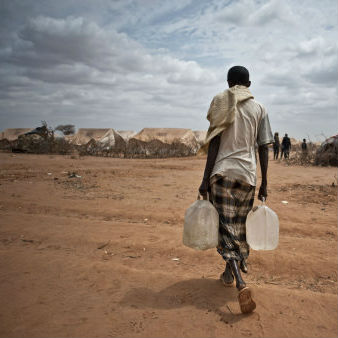With millions on the brink of starvation, the Catholic Church in Kenya is calling on the Government to declare the escalating drought a national disaster.
“We have been closely monitoring the current drought situation in the country and reports from our Dioceses and Parishes indicate tales of suffering, desperation, hopelessness and in some cases, imminent loss of life,” said a statement released by the Kenya Conference of Catholic Bishops (KCCB) on 6 February.
Despite aid being given to those affected, the situation had not improved, explained KCCB’s chairman, Bishop Philip Anyolo.
“Even though the Kenyan government, Kenya Red Cross Society and other philanthropic groups have made varied interventions, these remain inadequate because the number affected is huge," he added during a press briefing in Nairobi.
The Government must declare the drought a national disaster in order to encourage the international community to step forward and assist the many Kenyans who are suffering and dying of hunger, urges the statement.
“We are in a state of hunger, a looming disaster,” it adds.
The Bishops, who launched their own church appeal alongside the statement, are calling on all “Christians and people of good will” to contribute money and food to help those affected.
Caritas Kenya, the Development and Humanitarian Arm of the Catholic Church, will coordinate this initiative.
The drought is currently affecting 2.7 million Kenyans.
"We have countless challenges. The drought has dried up all our water sources, wiped out our pasture and livestock,” Umuro Katelo, a resident of Dukana in Marsabit County told the Kenya Red Cross.
“The effects are severe causing mental problems to some people,” Umuro said, adding that a number of people have committed suicide “as they could not deal with the suffering”.
Marsabit County, in northern Kenya, is among 13 counties are classified in the Alarm Stage of drought, where livestock, crops and water supplies are directly threatened.
In December 2016, the Kenya Red Cross reported 1.3 million people food insecure. The situation has since escalated dramatically. As of February this figure has spiralled to 2.7 million people.
“Currently, 23 out of 47 counties are facing drought and the numbers will continue rising,” said Dr Abbas Gullet, Secretary General, Kenya Red Cross Society.
“Indications are that the April 2017 long rains may not be sufficient. It is therefore our fundamental responsibility to assist the central and county governments to quickly respond to the plight of the affected communities,” Dr Abbas added.
Over the past two weeks, thousands of heavily armed herders have invaded wildlife conservation areas, private properties and smallholdings in Laikipia, one of Kenya’s most important wildlife areas, as they search for pasture for their cattle.
The herders have indiscriminately killed wildlife – from elephants, giraffes, zebras and lions to family dogs, reports the Guardian, adding that at least one person has been killed.
Although drought is one driver behind the invasions, some believe the land invasions by Pokot and Samburu tribesmen are being encouraged in the latest expression of tribalism and political rivalry, which have flared up ahead of the general election in August.
Politicians are using the drought to stir up loyalties amongst locals in the hope that it might propel them ahead of their rivals, reports local Kenya paper, The Standard.
“This is one of the many tactics they [politicians] are perfecting to intimidate genuine landowners whilst hoping to impress the masses with their passion for 'fighting for community interests'", reported the Standard on 5 February.




 Loading ...
Loading ...